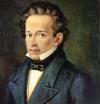The damsel from the field returns,
The sun is sinking in the west;
Her bundle on her head she sets,
And in her hand she bears
A bunch of roses and of violets.
To-morrow is a holiday,
And she, as usual, must them wear
Upon her bodice, in her hair.
The old crone sits among her mates,
Upon the stairs, and spins;
And, looking at the fading light,
Of good old-fashioned times she prates,
When she, too, dressed for holidays,
And with light heart, and limb as light,
Would dance at night
With the companions of her merry days.
The twilight shades around us close,
The sky to deepest blue is turned;
From hills and roofs the shadows fall,
And the new moon her face of silver shows.
And now the cheerful bell
Proclaims the coming festival.
By its familiar voice
How every heart is cheered!
The children all in troops,
Around the little square
Go, leaping here and there,
And make a joyful sound.
Meanwhile the ploughman, whistling, returns
Unto his humble nest,
And thinks with pleasure of his day of rest.
Then, when all other lights are out,
And all is silent round,
The hammer's stroke we hear,
We hear the saw of carpenter,
Who with closed doors his vigil keeps,
Toils o'er his lamp and strives so hard,
His work to finish ere the dawn appear.
The dearest day of all the week
Is this, of hope and joy so full;
To-morrow, sad and dull,
The hours will bring, for each must in his thought
His customary task-work seek.
Thou little, sportive boy,
This blooming age of thine
Is like to-day, so full of joy;
And is the day, indeed,
That must the sabbath of thy life precede.
Enjoy, it, then, my darling child,
Nor speed the flying hours!
I say to thee no more:
Alas, in this sad world of ours,
How far exceeds the holiday,
The day that goes before!






